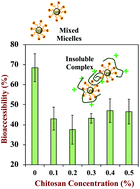Consumption of sufficiently high quantities of dietary fibers has been linked to a range of health benefits. Recent research, however, has shown that some dietary fibers interfere with lipid digestion, which may reduce the bioavailability of oil-soluble vitamins and nutraceuticals. For this reason, we examined the impact of a cationic polysaccharide (chitosan) on the bioaccessibility of vitamin D using the standardized INFOGEST in vitro digestion model. The vitamin D was encapsulated within an emulsion-based delivery system that contained whey protein-coated corn oil droplets. Our results showed that chitosan promoted severe droplet flocculation in the small intestine and reduced the amount of free fatty acids detected using a pH-stat method. However, a back-titration of the digested sample showed that the lipids were fully digested at all chitosan levels used (0.1–0.5%), suggesting that chitosan may have bound some of the free fatty acids released during lipid digestion. The presence of the chitosan decreased the bioaccessibility of vitamin D by about 37%, but this effect did not depend strongly on chitosan concentration (0.1–0.5%). It was hypothesized that chitosan bound to the vitamin-loaded mixed micelles and promoted their precipitation. The knowledge gained in this study might provide useful insights in designing emulsion-based delivery systems with high vitamin bioaccessibility.

